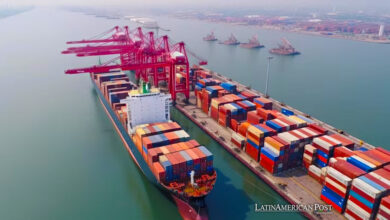Russian and Chinese imperialism in Latin America? The Increasing iInfluence Of Superpowers
While the United States loses influence in Latin America, Russia and China take advantage of it to strengthen their economic and military presence in the area .

LatinAmerican Post | Nicolás Donoso Álvarez
Leer en español: ¿Imperialismo ruso y chino en América Latina? Cada vez más influencia de las superpotencias
In an increasingly globalized world, it is very necessary for the great hegemonic powers of the world to expand their presence in a large part of the continents, in order to achieve greater political, economic, military and territorial influence. Because that can position them above another nation with great aspirations and, on top of that, it allows them to strengthen relations and ties with countries that require commercial or other agreements. In other words, a certain dependency is generated and both parties, to a greater or lesser extent, benefit from the relationship.
In recent years, both Russia and China have moved closer to Latin America, and this is no coincidence. In the case of the Russians, there are economic agreements with Venezuela and, as a result of the coronavirus pandemic, it must be remembered that in order to start the immunization process, the Russians donated doses of the Sputnik V vaccine to countries such as Argentina, Nicaragua, Venezuela, Paraguay and Bolivia, which helped the health systems of those nations resist the waves of covid-19 as much as possible.
Regarding China, the Asian giant looks to the continent for raw materials and a friendlier market that allows it to continue developing. So there are undeniable economic interests. In fact, China has free trade agreements with Chile, Costa Rica and Peru. With Chile, for example, the South American country’s copper production tempted the Asians, as did the supplies of metallic minerals in the case of Peru or the electronic products offered by the Costa Ricans.
Russia and China approach Latin America
According to the Economic Commission for Latin America and the Caribbean (ECLAC), by 2020 and in relation to investment announcements by Chinese companies in Latin America and the Caribbean, the sectors that China is betting on have become more diverse. The automotive sector leads with 44%, the renewable energy sector follows with 17%, the financial services sector with 11% and the consumer goods sector also stands out with 6%.
The data provided by the ALC-China Network in a study carried out in the midst of a pandemic also says a lot. Between 2015 and 2020, China with its private and state companies invested almost 75,000 million dollars in the different Latin American nations and has concentrated 77% of its investment in Colombia, Mexico and Chile. It is no coincidence that the World Economic Forum (WEF) projected that, in about 15 more years, Asians could become the main trading partners for Latin America, surpassing the United States.
In relation to Russia, its presence and influence in the territory has previously been discussed, especially with countries considered authoritarian in the region, such as Nicaragua, Venezuela and Cuba. Cubans and Venezuelans are often strategic allies for the Russians; Venezuela has supported it militarily on more than one occasion and with Cuba there is a strategic cooperation that not even the health emergency has been able to completely stop.
Also read: Colombian Elections: Main Differences Between the Proposals of Rodolfo Hernández and Gustavo Petro
Nor should we forget that last February, the president of Venezuela, Nicolás Maduro, declared that “we have ratified the path of powerful military cooperation between Russia and Venezuela for the defense of peace, sovereignty, territorial integrity, a powerful military cooperation. This statement in the midst of a conflict between Russia and Ukraine that at that time did not end up reaching its peak, but where Russia’s allies already supported it, which says a lot.
United States loses influence
With Russia and China having a strong presence on the continent, the United States is beginning to lose some of its prominence. We no longer speak only of Latin countries that negotiate with others or that seek allies beyond the United States, but what the Americans do does not seem to be so significant.
The clearest example was the last Summit of the Americas, a meeting between heads of state and government of the countries of the Americas, where different problems that affect the continent are addressed. Years ago it was a very relevant event, but this last time it was not. By not inviting Nicaragua, Cuba and Venezuela, the president of Mexico, Andrés Manuel López Obrador, ruled out their participation, which can be considered a severe blow to the United States. Honduras, El Salvador, Guatemala and Bolivia did not go either.
If the United States did not achieve a broad, participatory meeting where political issues could be discussed, it is because clearly its influence in the territory is less than it once had, and this may be due to the fact that Russia and China appear as real threats to the country led by Joe Biden, or because the United States has been unable to define itself on very important issues for Latinos, such as drug trafficking, immigration and the economy. These topics are very important today and should be discussed, with broad participation.




